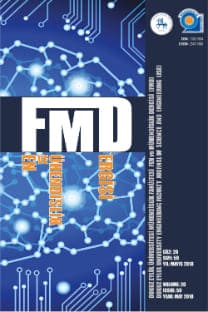Yarıiletken Aygıt Karakterizasyonu içinArduino UNO Tabanlı Otomatik Hall/DirençÖlçüm Sistem Tasarımı ve Uygulaması
Arduino UNO Based Automated Hall/Resistance Measurement System Design and Application for Semiconductor Device Characterization
___
- [1] Beck, W.A., Anderson, J.R. 1987. Determination of electrical transport properties using a novel magnetic field-dependent Hall technique, Journal of Applied Physics, Vol. 62, p. 541–554. DOI:10.1063/1.339780.
- [2] Wernera, F. 2017. Hall measurements on lowmobility thin films. Journal of Applied Physics, Vol. 122, (13), p. 135306-(1-13). DOI:10.1063/1.4990470.
- [3] Microchip. https://www.microchip.com/wwwproducts/en/AT mega2560 (Erişim Tarihi: 06.12.2020).
- [4] Ja’afaru, S., Dogara, M.D., Isaac, H.D., Gyuk, P.M., Iyen, C. 2018, Comparison Between a Constructed Arduino Based System and Keithley Sourcemeter 2400 on Some Electronics Devices, Science World Journal, Vol. 13, No(2), p. 55-57. DOI:10.4314/SWJ.V13I2.
- [5] Guvench, S., Denton, M., Rollins, M., Guvench, M. 2000, Automated Semiconductor Device/Sensor Measurement System For Temperature And Magnetic Field Characterization, 2000 Annual Conference, 18-21.06.2000, St. Louis, Missouri, p. 5.119.1 - 5.119.8, DOI: 10.18260/1-2--8177.
- [6] Güngör, T., Uslu, B., Güngör, E., Böbrek, A. 2019. Arduino Tabanlı Döndürerek İnce Film Kaplama Sistemi Tasarımı ve MgO İnce Film Üretimi, Uluslararası Mühendislik Tasarım ve Teknoloji Dergisi, Cilt 1. (1), s. 31-35.
- [7] Van der Pauw, L.J., 1958. A method of measuring specifc resistivity and Hall efect of discs of arbitrary shape. Philips Research Reports, Vol. 13, p.1–9.
- [8] Van der Pauw, L.J., 1958/1959. A. Method of measuring the resistivity and hall coefcient on lamellae of arbitrary shape. Philips Research Reports, Vol.20, p.220–224.
- [9] NIST, https://www.nist.gov/pml/nanoscale-devicecharacterization-division/popular-links/hall-effect (Erişim Tarihi: 06.12.2020). [10] El-Hinnawy, N. https://www.microwaves101.com/encyclopedias/ van-der-pauw-measurements (Erişim Tarihi: 06.12.2020).
- [11] Kasl, C., Kasl, M.J.R. 2005. Efects of sample thickness on the van der Pauw technique for resistivity measurements. Review of Scientific Instruments, Vol. 76, p033907-(1-4). DOI:10.1063/1.1866232.
- [12] Smith, B.J., Chwang, R., Crowell, C.R. 1974. Contact size efects on the van der Pauw method for resistivity and Hall coefcient measurement. Solid-State Electronics, Vol. 17, p-1217-1227. DOI:10.1016/0038-1101(74)90001-X.
- [13] Koon, D.W. 1989. Efect of contact size and placement, and of resistive inhomogeneities on van der Pauw measurements. Review of Scientific Instruments, Vol. 60, p 271-274. DOI:10.1063/1.1140422.
- [14] Wu, B., Huang X., Han, Y., Gao, C., Peng, G., Liu, C., Wang, Y., Cul, X., Zou, G. 2010. Finite element analysis of the efect of electrodes placement on accurate resistivity measurement in a diamond anvil cell with van der Pauw technique. Journal of Applied Physics, Vol. 107, p-104903-(1-4). DOI:10.1063/1.3374466.
- [15] Matsumura, T., Sato, Y.A. 2010. Theoretical study on van der Pauw measurement values of inhomogeneous compound semiconductor thin flms. Journal of Modern Physics, Vol. 1, p340- 347.DOI:10.4236/jmp.2010.15048.
- [16] Reveil, M., Sorg, V.C, Cheng, E.R., Ezzyat, T., Clancy, P., Michael, O.T. 2017. Finite element and analytical solutions for van der Pauw and four-point probe correction factors when multiple non-ideal measurement conditions coexist. Review of Scientific Instruments, Vol. 88, p094704-(1-12). DOI:10.1063/1.5001830.
- [17] Hall, E.H. 1879. On a New Action of the Magnet on Electrical Current. The American Journal of Mathematics, Vol. 2, p-287-292. DOI:10.2307/2369245.
- [18] Ausserlechner, U. 2016. Closed form expressions for sheet resistance and mobility from Van-der-Pauw measurement on 90° symmetric devices with four arbitrary contacts. Solid-State Electronics, Vol. 116, p-46-55. DOI: 10.1016/j.sse.2015.11.030.
- ISSN: 1302-9304
- Yayın Aralığı: 3
- Başlangıç: 1999
- Yayıncı: Dokuz Eylül Üniversitesi Mühendislik Fakültesi
Dokuz-Boyutlu Lorenz Sisteminin Sayısal Çözümleri
Begüm Nurpelin Sağlık, Derya Osmaniye
Aşağı ve Yukarı Yönlü NOMA Haberleşme Sistemleri için CNN Yardımlı Alternatif Sezici Tasarımı
Hakan Kaya, Ferdi Kara, Ahmet Emir
Farklı Çiçek Türlerini Derin Öğrenme Yöntemi İle Tanıma
Ayşe Demirhan, Ulaş Alperen Coşkun
Şahika Özdemir, Kemal Gökhan Nalbant
Görüntüleme Sistemleri İçin Kalıcı Mıknatıslarda Optimum Performans İncelemesi
